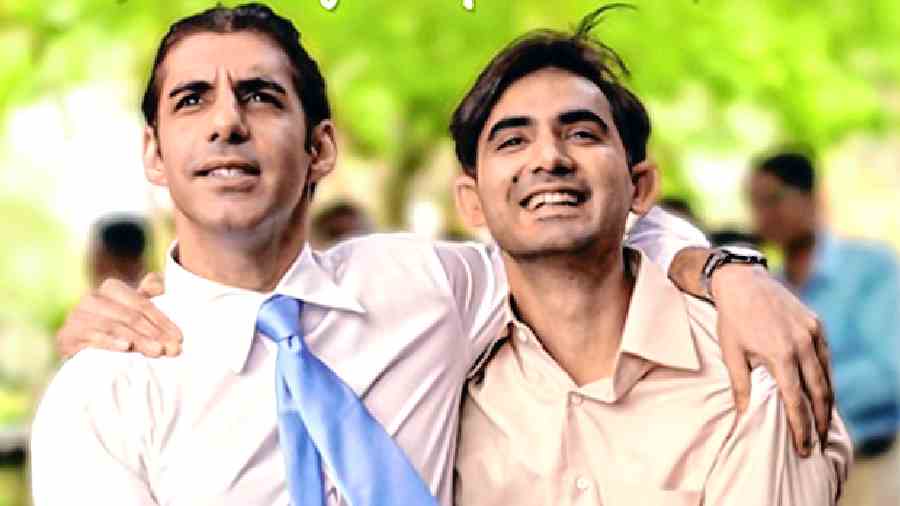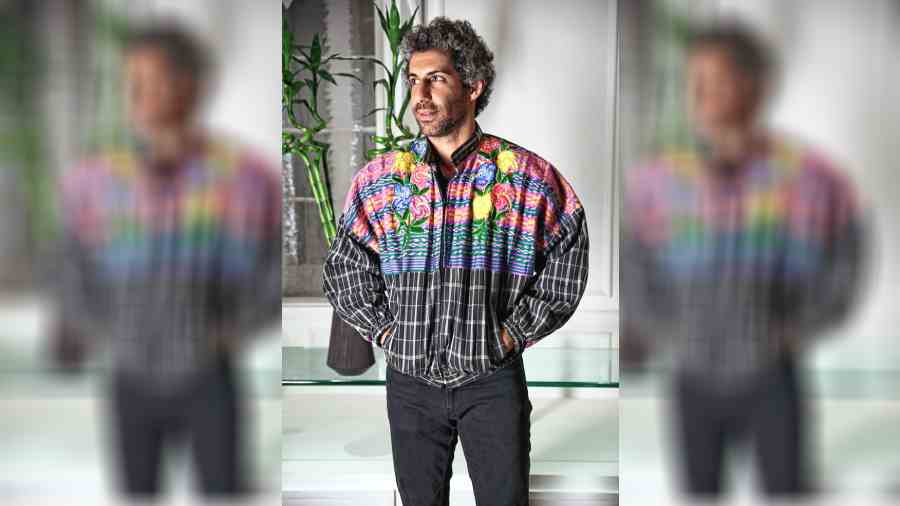Rocket Boys is a rare Indian web series which has won an equal amount of praise for both seasons. This has been in no small measure to the flawless performances of its strong ensemble cast led by Jim Sarbh, who plays Homi Bhabha, and Ishwak Singh in the role of Vikram Sarabhai.
Like Season 1, the second season of the SonyLIV show, directed by Abhay Pannu, is a compelling blend of fact and fiction, with both Jim and Ishwak slipping effortlessly into the shoes of the real-life heroes whose achievements in the field of science have made India a nuclear superpower today. The Telegraph caught up with Jim, who has won both praise and prize for his stellar portrayal of Bhabha, for a chat.
Both seasons of Rocket Boys have been critically acclaimed. What do you think has worked so well for the show?
I don't feel like giving my own show taareef (laughs), but I will definitely say that it is a beautifully written and directed show. Right from the beginning, Abhay Pannu (the show's director) has worked tirelessly — at least with me, I don't know about the others — to rehearse, workshop and discuss the scenes.... The show has great background music and sound design. I love the title sequence, I love the theme song....
Rocket Boys has been made keeping the most essential element in mind — that it has to be entertaining. Given the subject matter and given these great men (Homi Bhabha and Vikram Sarabhai) and the fact that we were given a window into their lives, Abhay never forgot to make sure that it was also phenomenally entertaining.
Did the familiarity that came with playing Homi Bhabha in Season 1 help you in Season 2?
It does help. One definitely tries to approach each new season as something fresh, but you already have a sense of the character. It's like as you grow older, it's easier to be yourself (smiles).
What was your understanding of Homi Bhabha before you played him and how has that changed, if at all, now?
I really didn't have much understanding of him before... I just knew his name and sketchily, what his contribution to society was. I didn't know anything about him as a man. And now that I have played him, I am very impressed with who he was. I think he's a complete man. I absolutely adore his curiosity about things and his relentless pursuit of the work required to investigate that curiosity.
Are there any common character traits between him and you?
By virtue of the simple fact that actors pick to play a particular role means that there is something there already. I don't think an actor is never himself, even when he is playing someone else. It's always yourself doing a version of a character. A character is just lines on a page and as an actor, you have to flesh it out. And by that, I mean fleshing it out in terms of his actions and not his back story.
If I play a waiter in a scene and it's very well written and they give me the costume of a waiter, it really doesn't matter to me where this guy went to school or what he did as a kid... the scene by itself is good already.

Jim Sarbh as Homi Bhabha with Ishwak Singh as Vikram Sarabhai in Rocket Boys, streaming on SonyLIV
Did you improvise on the Rocket Boys set?
Sometimes I would get ideas on set, but mostly we workshopped and rehearsed the scenes before, especially me and Abhay. We would sit together and go through the scenes, discuss and try and block them in advance so that we could save time on set.
Sometimes, a magical idea would pop up, but even that would happen because of the time we put into rehearsing. Abhay is very responsive and adaptive. He knows what he wants and he will guide his actors there. But if an actor gets a great idea after getting there, he will definitely take it into account.
Improvisation doesn't necessarily mean changing the lines... it could also be about a different approach to a scene. For example, there is a scene between Homi and Vikram (played by Ishwak Singh) in a library where Homi invites Vikram to a party and Vikram starts talking about how he is going for a Gandhi rally. As written on paper, it was an argument, but then we thought about it and on set, I just started handing him books and I kept handing him books... and then he had a huge stack of books covering his face! And I just kept throwing more books at his face during the course of the argument and it organically changed from an argument to a lighter conversation between two people who just don't understand the import of this rally just yet.
Looking back, we know the historical significance of these rallies because they eventually led to the nation's freedom. But at that point, in that scene, they were just two ambitious men in a library. One is saying that doing your job is the best thing you can do for your country, and the other says that you have to believe in something bigger than yourself to be able to do your job better. I really loved how well that scene turned out because Ishwak really responded well to the comedy of it.
Moments like this happened on set often. Sometimes it would work and we would run with it and sometimes it wouldn't work and we would go back to what we thought would work better.
How much does your prolific background in theatre enable you to come up with such moments spontaneously?
There are many incredibly spontaneous and reactive actors who have never worked in theatre. So I wouldn't really say I owe it completely to that. What I will say though is that doing theatre establishes the idea of doing rehearsals very strongly in an actor.
I disagree with people saying that spontaneity comes when one doesn't learn one's lines. The best actors that I have worked with on stage and screen are clearly those who have rehearsed their lines. I believe that spontaneity can only come if you are relaxed and are not thinking of what's coming next. Then you can actually react to what's happening and you don't have to be worried about missing your cue or missing your line.
Of all the mediums you work on, would it be fair to say that you feel the most alive on stage?
I don't think so. Sometimes, even theatre can become drudgery, just like how films and web series can be. Or theatre can sometimes be the absolute magical, almost spiritual aliveness of work, but then other mediums could also be the same. There have been days when I am doing a steadicam shot of five minutes and I know that it is so much more technical than on stage... on stage, one can play a five-minute scene easy-peasy... there are not that many complications with light and sound, the steadicam operator and the five men standing behind the steadicam operator! (Laughs) Achieving a scene for the screen in the middle of all of it really does make an actor feel a kind of exhilarating rush.
What I will definitely say about theatre is that it is the toughest. If you are bad that day, you are bad... you don't get a second take. if you do badly, everybody bloody knows (laughs). Whereas in a film, if it's a single take and you are bad that day and don't seem to be getting it right at any cost, the director just changes the shot division... they have more cuts and figure out a way to save the scene.
I have seen people on set who just can't get it right on that particular day. And later when you watch the scene, it turns out just fine, which is the magic of editing and directing. It's incredible! But on stage, there is no escaping.
Has that happened to you?
Have I been bad?! Yes, on Rocket Boys 2....
But we couldn't tell because your director took care of it...
Some things even he can't fix! (Laughs)











